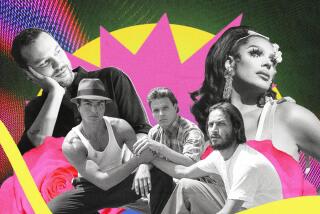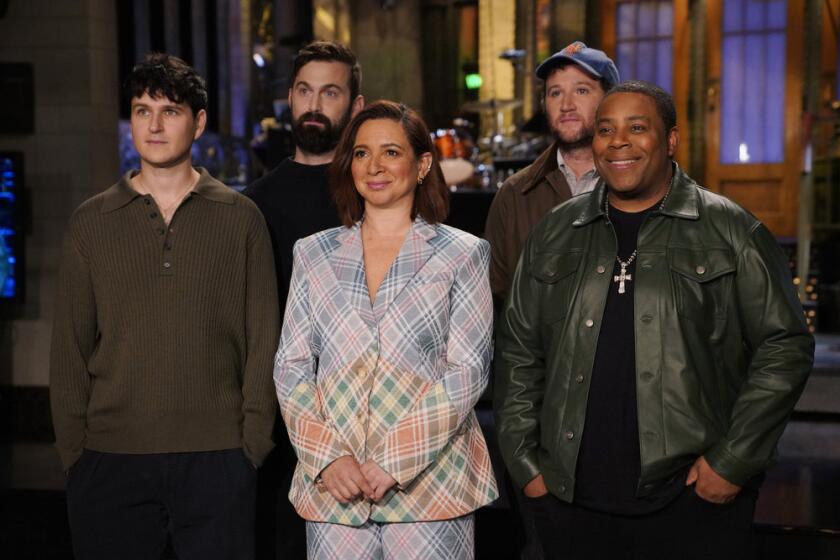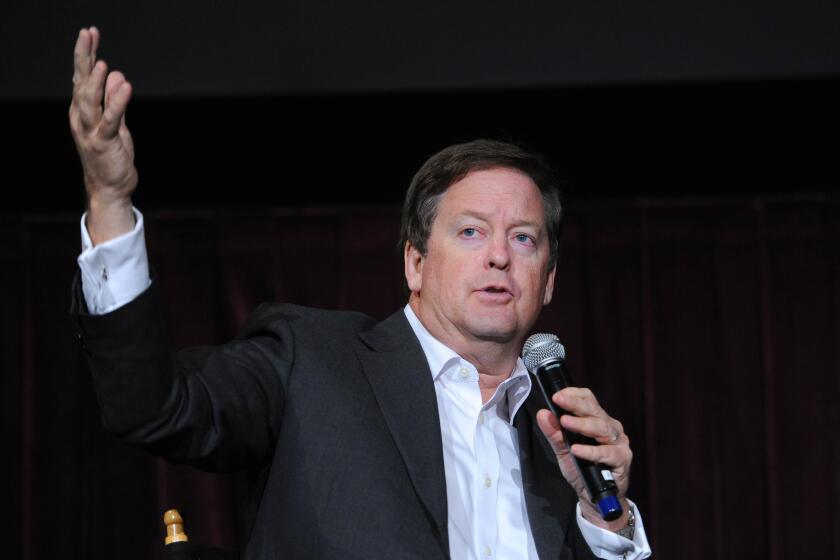From Vaporú to coming out, NHMC amplifies an array of Latinx voices
One minute a child is enjoying a nice helping of frozen yogurt. When he’s suddenly stricken with brain-freeze, the people he is eating with react with fear and try to ease his pain.
Next thing he knows he’s covered in a thick layer of Vicks VapoRub while someone’s abuelita (but definitely not his own grandma) has lighted an unsettling number of candles and has summoned the divine to heal him.
As outlandish as it sounds, this is an experience very familiar to many in the Latinx community. And it perfectly set the mood at this year’s National Hispanic Media Coalition’s Latino Scene Showcase at El Portal Theatre in North Hollywood.
‘Vivaporu’: For many Latinos, memories of Vicks VapoRub are as strong as the scent of eucalyptus »
The showcase, now in its seventh year, highlights Latinx writers, actors and directors by giving them a platform to perform in front of industry executives, agents, talent managers and casting directors.
At Wednesday’s event, representatives from Netflix, Amazon Studios, CBS, ABC, HBO, Starz, the Writers Guild of America West and Univision attended.
“Latinos make up 24% of movie-goers and yet statistics show that we are only a little over 3% of the roles” said Brenda Castillo, incoming president and chief executive of NHMC. “We’re all about building a pipeline between Latinx talent and the industry.”
The NHMC was founded 33 years ago to address the lack of Latinx representation in film and television and to create opportunities both in front of and behind the camera.
“We do this because how [Latinx people] are perceived is how we are treated, and we are not treated well across the country right now,” said current NHMC President and Chief Executive Alex Nogales. “If we’re absent from mainstream media, we are always going to be looked down on. And if we’re stereotyped, it’s just as bad.”
Since NHMC launched, its relationship with the entertainment industry has evolved. The organization used to reach out to executives to stay on their radar, but the tables have turned. Now the industry is eager to work with the NHMC because it realizes that Latinx people are more needed and marketable than ever before.
4 Latino stereotypes in TV and film that need to go »
Castillo has noticed this shift and said it’s more important that the multitude of Latinx stories be told accurately. “For it to be authentic, it should be Latinos telling our own stories,” she said.
This year’s showcase featured six short scenes, which involved the magical healing powers of abuelas (grandmothers), a demon Realtor helping Adam and Eve apartment hunt in Sodom and a woman struggling with her identity after motherhood.
As a space for encouraging increased representation, the showcase also told the stories of marginalized groups within the Latinx community, including women and the LGBTQ community. Of the six scenes performed, women wrote two and directed four of them.
Actress Elena Campbell-Martínez, who stars as Doña Lupe on the Starz series “Vida,” directed two of the night’s scenes. She said she was drawn to the showcase because it put a spotlight on the experience of growing up in a Latinx household.
In Starz’s new ‘Vida,’ the politics of gender and gentrification on L.A.’s Eastside get personal »
Nikki Taguluas-Pierce, who wrote the brain-freeze scene, said she was interested in exploring some of the stranger experiences she had growing up Latina. (Taguluas-Pierce had aunts who would tell her she could alleviate suffering by lighting a candle and burying the wax.)
A scene titled “Guero,” written by Joe Gonzalez, focused on a young man who is coming out as a Republican to his parents, who didn’t take the news well. . After being berated for several minutes, the son finally told his parents that he’s actually not a Republican — but instead revealed that he is gay.
Nathanel Martinez, who played the son in that scene, was drawn to the character because, as someone who identifies as queer, he understood the fear and liberation of coming out. He knows from having religious Hispanic parents how they might react to that type of news. Martinez also liked the idea of the scene having “real representation.”
“There are straight actors who play gay roles, but for being Latino and actually queer, it’s really important to actually showcase that,” he said.
Becoming part of the showcase is no small task. Actors must go through the full wringer of the casting process, competing against hundreds of other worthy actors and awaiting the prospect of a callback. This year’s group of actors ended up auditioning for casting directors from NBC, ABC and the Casting Society of America.
The hard work can pay off, though: Two former participants in the program are now working for Netflix and one is at Disney.
Castillo is excited that, even though there is still much work to be done, the need and want for Latinx stars is finally catching up with the community’s talent.
More to Read
The biggest entertainment stories
Get our big stories about Hollywood, film, television, music, arts, culture and more right in your inbox as soon as they publish.
You may occasionally receive promotional content from the Los Angeles Times.






